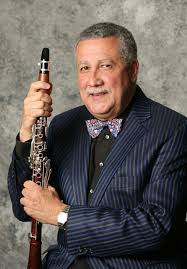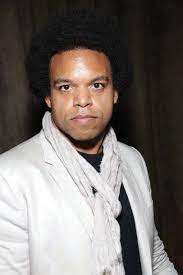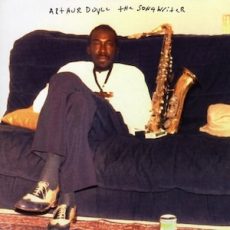
PAQUITO D’RIVERA
Paquito D’Rivera has won a combined 16 Grammy and Latin Grammy Awards (5 Grammy and 11 Latin Grammys). He is celebrated both for his artistry in Latin jazz and his achievements as a classical composer.
Born in Havana, Cuba, he performed at age 10 with the National Theater Orchestra, studied at the Havana Conservatory of Music, and at 17, became a featured soloist with the Cuban National Symphony. As a founding member of the Orquesta Cubana de Musica Moderna, he directed that group for two years, while at the same time playing both the clarinet and saxophone with the Cuban National Symphony Orchestra.
He eventually went on to premiere several works by notable Cuban composers with the same orchestra. Additionally, he was a founding member and co-director of the innovative musical ensemble Irakere. With its explosive mixture of jazz, rock, classical and traditional Cuban music never before heard, Irakere toured extensively throughout America and Europe.
The Band:
Paquito D’Rivera – Clarinet, Alto Saxophone
Alex Brown – Piano
Oscar Stagnaro – Electric Bass
Mark Walker – Drums
Pernells Saturnino – Percussion
Victor Provost – Steel pans
More Posts: adventure,clarinet,club,genius,history,instrumental,jazz,music,preserving,saxophone,travel

ELEW TRIO
More Posts: adventure,album,bass,cello,clarinet,club,genius,jazz,music,piano,preserving,travel

VIRGINIA MACDONALD | TODD MARCUS
More Posts: adventure,clarinet,club,genius,jazz,music,preserving,travel

VIRGINIA MACDONALD ~ TODD MARCUS QUINTET
Juno Award-nominated clarinetist Virginia MacDonald has established herself as a rising star of her generation. Known for her lyrical and soulful clarinet playing, Virginia has been described as a “powerful new voice in the Canadian scene” by Juno Award-winning bassist Mike Downes. As a highly in-demand bandleader, sidewoman, and composer, Virginia keeps a regular performance schedule across Canada, the United States, and Europe.
Bass clarinetist, composer, and bandleader Todd Marcus is one of the few jazz artists worldwide to focus their work primarily on the bass clarinet. Though use of bass clarinet in jazz typically leans heavily towards avant-garde and free-jazz styles, Marcus’ straight-ahead playing has carved out a unique voice for the instrument in modern jazz.
Musicians:
Virginia MacDonald – clarinet
Todd Marcus – bass clarinet
Bruce Barth – piano
Blake Meister – bass
Eric Kennedy – drums
More Posts: adventure,clarinet,club,genius,jazz,music,oud,preserving,travel

Daily Dose Of Jazz…
Arthur Doyle was born June 26, 1944 in Birmingham, Alabama and was inspired to play music as a child after watching Louis Armstrong and Duke Ellington on television. During his high school years, he began listening to Miles Davis, John Coltrane and Sonny Rollins, and picked up gigs as a saxophonist. While still a teenager, he played with saxophonist Otto Ford, trumpeter Walter Miller and in R&B and blues groups.
After graduating high school, Doyle attended Tennessee State University in Nashville, receiving a degree in Music Education. While there he played with trumpeter Louis Smith and singers Gladys Knight and Donny Hathaway. He briefly went to Detroit, Michigan to play with hard bop trumpeter Charles Moore. He gravitated toward free jazz after playing at a Black Panthers festival.
Moving to New York City in 1968, Doyle worked with Sun Ra and Bill Dixon, and met and befriended saxophonist Pharoah Sanders and guitarist Sonny Sharrock. The following year, he recorded with Noah Howard and while in the city he met drummer Milford Graves, who encouraged him to pursue his natural affinity for pure sound. In 1977 he recorded his debut album Alabama Feeling, his first as a leader. He began playing with guitarist Rudolph Grey, and in 1980 along with Grey and drummer Beaver Harris, they became known as The Blue Humans and recorded Live NY 1980.
At around this time, Arthur began struggling with anxiety issues, and moved to Endicott, New York, where he worked as a counselor. In 1981, he moved to Paris, France where he began an association with multi-instrumentalist Alan Silva and his Celestrial Communication Orchestra, and participated in the recording of the album Desert Mirage in 1982. The following year, while in France, he was accused of rape and imprisoned. Maintaining his innocence he was pardoned and released in 1988 and during his time in prison, he wrote over 150 songs and assembled what he called the Arthur Doyle Songbook.
In the early Nineties Doyle returned to the United States, moving back to Endicott, and restarted his involvement in music. He resumed his association with Grey, playing at CBGB and releasing Arthur Doyle Plays and Sings from the Songbook Volume One on Grey’s Audible Hiss label. Over the next decade, he played and recorded with drummers Hamid Drake, Sabu Toyozumi, and Sunny Murray, among others, and formed The Arthur Doyle Electro-Acoustic Ensemble.
Saxophonist, bass clarinetist, flutist, and vocalist Arthur Doyle, who was best known for playing what he called free jazz soul music, died on January 25, 2014 in his hometown.
More Posts: bandleader,clarinet,flute,history,instrumental,jazz,music,saxophone,vocal


